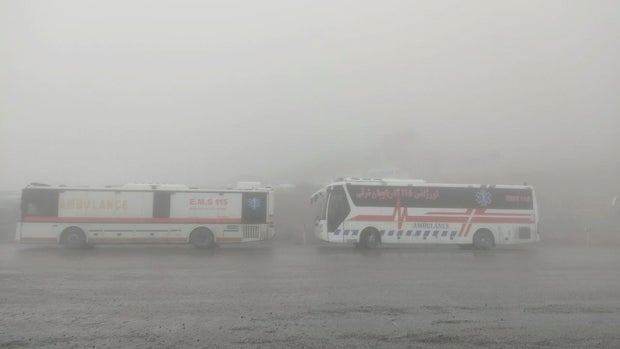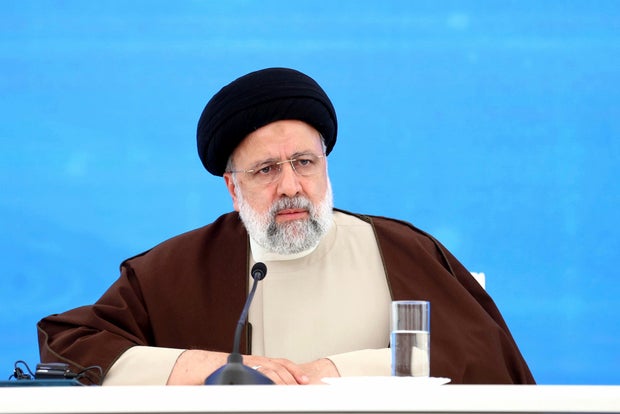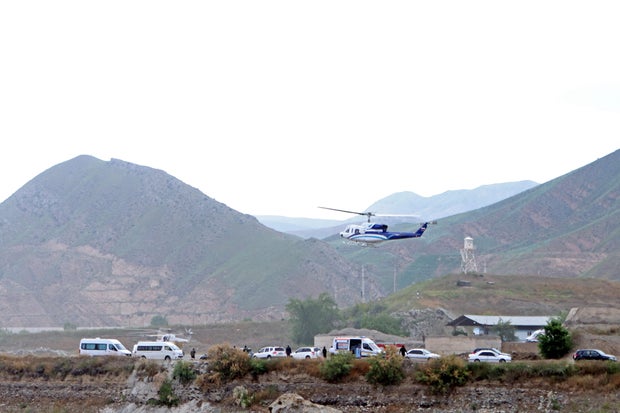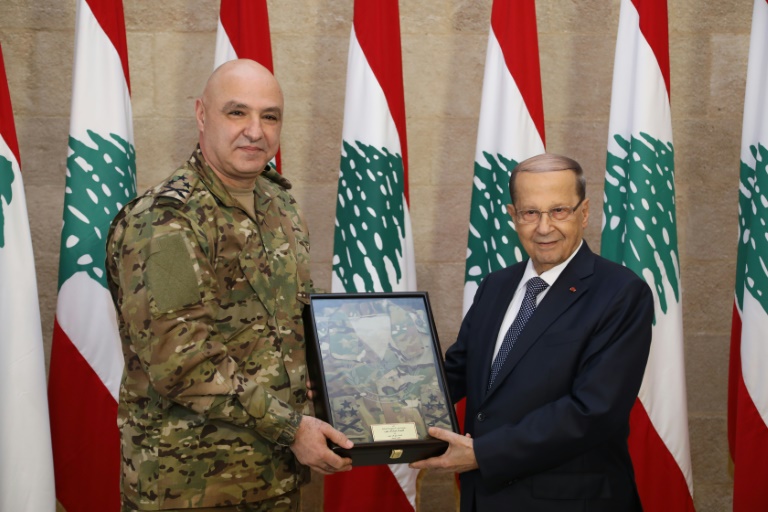A helicopter carrying Iranian President Ebrahim Raisi, the country’s foreign minister and other officials apparently crashed in the mountainous northwest reaches of Iran on Sunday, sparking a massive rescue operation in a fog-shrouded forest.
Raisi was traveling in Iran’s East Azerbaijan province. State TV said what it called a “hard landing” happened near Jolfa, a city on the border with the nation of Azerbaijan, some 600 kilometers (375 miles) northwest of the Iranian capital, Tehran. Later, state TV put the location farther east near the village of Uzi, but details remained contradictory.
Azin Haghighi/Moj News Agency/WANA (West Asia News Agency) via REUTERS
Traveling with Raisi were Iran’s Foreign Minister Hossein Amirabdollahian, the governor of Iran’s East Azerbaijan province and other officials and bodyguards, the state-run IRNA news agency reported. One local government official used the word “crash,” but others referred to either a “hard landing” or an “incident.”
Neither IRNA nor state TV offered any information on Raisi’s condition.
However, hard-liners urged the public to pray for him. State TV later aired images of the faithful praying at Imam Reza Shrine in the city of Mashhad, one of Shiite Islam’s holiest sites, as well as in Qom and other locations across the country. State television’s main channel aired the prayers nonstop.
“The esteemed president and company were on their way back aboard some helicopters and one of the helicopters was forced to make a hard landing due to the bad weather and fog,” Interior Minister Ahmad Vahidi said in comments aired on state TV. “Various rescue teams are on their way to the region but because of the poor weather and fogginess it might take time for them to reach the helicopter.” State TV reported that there had been heavy rain, and IRNA called the area a “forest.”
Iranian Presidency Office via AP
Long after the sun set, Iranian government spokesman Ali Bahadori Jahromi also acknowledged that “we are experiencing difficult and complicated conditions” in the search.
“It is the right of the people and the media to be aware of the latest news about the president’s helicopter accident, but considering the coordinates of the incident site and the weather conditions, there is ‘no’ new news whatsoever until now,” he wrote on the social platform X. “In these moments, patience, prayer and trust in relief groups are the way forward.”
A rescue helicopter tried to reach the area where authorities believe Raisi’s helicopter was, but it couldn’t land due to heavy mist, emergency services spokesman Babak Yektaparast told IRNA. Late in the evening, Turkey’s defense ministry announced that it had sent an unmanned arial vehicle and was preparing to send a helicopter with night vision capabilities to join the search-and-rescue efforts.
In an update later Sunday, the commander of the East Azerbaijan Army Corps told Iran’s Tasnim news agency that a signal was received from the helicopter and a cell phone of one of the crew members at the accident site, adding that military forces were on their way to the area.
A spokesperson with the U.S. State Department told CBS News on Sunday they are closely following the reports.
The likely crash came as Iran under Raisi and Supreme Leader Ayatollah Ali Khamenei launched an unprecedented drone-and-missile attack on Israel last month and has enriched uranium closer than ever to weapons-grade levels.
Iran has also faced years of mass protests against its Shiite theocracy over an ailing economy and women’s rights – making the moment that much more sensitive for Tehran and the future of the country as the Israel-Hamas war inflames the wider Middle East.
Raisi had been in Azerbaijan early Sunday to inaugurate a dam with Azerbaijan’s President Ilham Aliyev. The dam is the third one that the two nations built on the Aras River. The visit came despite chilly relations between the two nations, including over a gun attack on Azerbaijan’s Embassy in Tehran in 2023, and Azerbaijan’s diplomatic relations with Israel, which Iran’s Shiite theocracy views as its main enemy in the region.
Ali Hamed Haghdoust/IRNA/WANA (West Asia News Agency) via REUTERS
“Azerbaijan stands ready to offer any assistance needed,” Aliyev said in a post on X. “We were profoundly troubled by the news of a helicopter carrying the top delegation crash-landing in Iran.”
Iran flies a variety of helicopters in the country, but international sanctions make it difficult to obtain parts for them. Its military air fleet also largely dates back to before the 1979 Islamic Revolution.
Raisi, 63, is a hard-liner who formerly led the country’s judiciary. He is viewed as a protégé of Iran’s Supreme Leader Ayatollah Ali Khamenei and some analysts have suggested he could replace the 85-year-old leader after his death or resignation from the role.
Raisi won Iran’s 2021 presidential election, a vote that saw the lowest turnout in the Islamic Republic’s history. Raisi is sanctioned by the U.S. in part over his involvement in the mass execution of thousands of political prisoners in 1988 at the end of the bloody Iran-Iraq war.
In 2022, he told “60 Minutes” that the sanctions, which were put in effect by former President Donald Trump and maintained by President Biden, are “tyrannical.”
“The new administration in the U.S., they claim that they are different from the Trump administration,” Raisi told Lesley Stahl. “They have said it in their messages to us. But we haven’t witnessed any changes in reality.”
Under Raisi, Iran now enriches uranium at nearly weapons-grade levels and hampers international inspections. Iran has armed Russia in its war on Ukraine, as well as launched a massive drone-and-missile attack on Israel amid its war against Hamas in the Gaza Strip. It also has continued arming proxy groups in the Mideast, like Yemen’s Houthi rebels and Lebanon’s Hezbollah.
























Discussion about this post